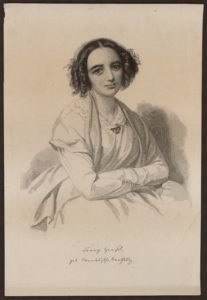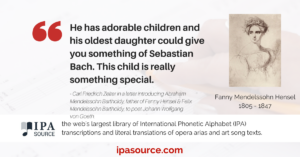
Fanny and Felix were children of Abraham and Lea Mendelssohn. When Napoleon’s troops occupied Hamburg in 1811, the Jewish family relocated to Berlin. In 1816, Fanny and Felix were baptized in Berlin as Lutherans, and the family took the surname of Bartholdy.
Abraham and Lea Mendelssohn valued education a great deal. They invested heavily in first self teaching their children, later arranging for tutors and other academic opportunities. Young Fanny’s mother Lea was her first piano teacher. (Lea Mendelssohn Bartholdy’s piano teacher was a student of Johann Sebastian Bach!) At age 13, Fanny could play all 24 Preludes from Bach’s The Well-Tempered Clavier from memory.
Societal customs of her time restricted women from pursuing musical careers. Women were expected to serve as wives and mothers rather than having occupation outside the home. While her brother Felix traveled and expanded his musical horizons, Fanny stayed in Berlin, continuing her pursuit of music within the confines of home. Her brother admired her work, but took the traditional stance of that time period that women not pursue careers other than being wives and mothers. She did convince Felix to publish six of her songs under his name, in his two sets of Twelve Songs (Opuses 8 and 9).
op. 008., as set by Felix Mendelssohn Bartholdy
- And’res Maienlied: Hexenlied
- Erntelied
- Frühlingslied – Jetzt kommt der Frühling
- Minnelied im Mai
- Pilgerspruch
- Romanze – Einmal aus seinen Blicken
op. 009., as set by Felix Mendelssohn Bartholdy
In exchange, Fanny served as an ongoing sounding board and critic of her brother’s work. Felix referred to her as “Minerva,” after the Roman Goddess of Wisdom, because he deeply valued her insight and musical knowledge.
Fanny married Wilhelm Hensel in 1829. The following year, their only child, Sebastian Ludwig Felix Hensel, was born. An interesting fact regarding the naming of Fanny and Wilhelm’s son: he was named after Fanny’s three favorite composers, in chronological order. Wilhelm was supportive of Fanny’s compositional efforts. Her work was performed alongside that of her brother Felix’s work at private, invitation-only salons held in the Mendelssohn household.
Fanny wrote more than 450 compositions, including chamber music, piano pieces, cantatas, oratorios, and lieder (art songs).
The handiwork of a number of poets were set by Fanny Hensel, including Heinrich Heine, Josef Karl Benedikt von Eichendorff, Johann Wolfgang von Goethe, Emanuel von Geibel, and Nikolaus Lenau. From the IPA Source database, here are a few selections as set by Fanny Mendelssohn Hensel:
Poet Heinrich Heine (1797-1856)
- Warum sind denn die Rosen so blaß
- Schwanenlied
- Ach, die Augen sind es wieder
- Allnächtlich im Traume seh’ ich dich
- Am leuchtenden Sommermorgen
- Das Meer erglänzte
Poet Josef Karl Benedikt von Eichendorff (1788-1857)
- Abendlich schon rauscht der Wald
- Schöne Fremde
- Morgenständchen
- Frühling
- Nachtwanderer
- Anklänge I
- Anklänge II and Anklänge III
- Bergeslust
- Nach Süden
Poet Emanuel von Geibel (1815-1884)
Poet Nikolaus Lenau (1802-1850)
Carl Friedrich Zelter, leader of the Sing-Akademie zu Berlin (of which Fanny and Felix were a part of), wrote a letter of introduction to the poet Johann Wolfgang von Goethe in 1816, introducing their father, Abraham Mendelssohn Bartholdy:

In a later letter to Goethe, Zelter described Fanny’s playing skills by saying “She plays like a man,” which was considered a high compliment at that time.
Poet Johann Wolfgang von Goethe (1749-1832)
Very few of Fanny Hensel’s compositions were published. Most are only in manuscript form. There are IPA translations of 66 art songs (lieder) as set by Fanny Mendelssohn Hensel in the IPA Source database. View our complete collection here: https://www.ipasource.com/composer/h/hensel-fanny-mendelssohn-1805-1847.html
Read more about the life of Fanny Hensel in our blog post of November, 2017.

One thought on “Featured composer: Fanny Mendelssohn Hensel”
Comments are closed.